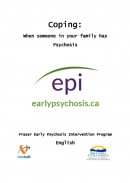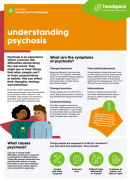If you're a frequent visitor to Healthify, why not share our site with a friend? Don't forget you can also browse Healthify without using your phone data.
Psychosis
Key points about psychosis
- Psychosis is when your perception of reality is different to that of other people and you may find it hard to know what’s real.
- About 3 in 100 people will experience psychosis at some stage in their life.
- You may see or hear things that others can’t (hallucinations) or develop unusual beliefs (delusions).
- Psychosis can occur for several different reasons. It may be part of a mental illness, a response to major stress or triggered by drug use.
- Symptoms vary from person to person and may interfere with day-to-day life. Signs of psychosis may be mild at first and become more obvious and severe over time.
- Psychosis can be treated, and getting treatment and support early makes a good recovery more likely.

Psychosis is when the way you experience reality changes, and you find it hard to know what’s real. It changes the way you think, feel, behave and see the world. Experiencing symptoms of psychosis is often referred to as having a psychotic episode.
During a psychotic episode, you may have trouble thinking straight, you may experience delusions (false beliefs or ideas) and/or hallucinations (seeing, hearing, smelling, sensing things that others can’t). Your behaviour and mood can change and you might feel very sad or very happy. You may feel disconnected from who you normally are, and from others around you.
A first psychotic episode is most likely to happen in your teenage years or early twenties. Because psychosis can be distressing and can distort your reality, it’s important to get help early. There is a range of treatments available, including medications, psychological therapies and social support. After recovering from the first episode many people never have another episode, but others may experience a number of relapses.
|
If you are worried that you or someone else is at immediate risk of self-harm, call 111. If there is no immediate risk, contact your healthcare provider. |
|---|
Video: What is psychosis? #whatispsychosis
The video below explains what psychosis is.
(COPMI – Children of Parents with a Mental Illness, Australia, 2015)
Psychosis usually first affects people in their late teens or early twenties, but older adults may also experience a first or subsequent episode of psychosis. It affects men and women equally, though men usually experience symptoms at a slightly younger age than women.
There is no one cause of psychosis. But there are certain risk factors that can make you more vulnerable to having it.
- Mental illness – psychosis can be part of the presentation of different conditions, eg, schizophrenia or severe mood disorders like depression or bipolar disorder.
- Substance use – some substances can cause psychosis, eg, cocaine, amphetamines (speed), marijuana, methamphetamine (meth), PCP, hallucinogens and sedatives. Alcohol, sedatives and hypnotics (sleep medication) can cause psychosis when you suddenly stop using them.
- Other health problems or a medical condition – physical injuries, diseases or health conditions such as brain injury or lupus can cause psychosis.
- Stress – intense stress can cause or contribute to psychosis.
Symptoms of psychosis vary from person to person and can interfere with day-to-day life. Signs of psychosis may be mild at first and become more serious over time.
Symptoms include:
- Delusions and confused thinking – beliefs that other people from a similar background to you don’t usually believe.
- Hallucinations – hearing, seeing, smelling, tasting or touching something that isn’t actually there
- Suspicion or paranoia.
- Unusual thinking (mixing up sentences, changing the topic frequently, others might not follow what you are saying).
- Behaviour that’s inappropriate for the situation you are in (talking to someone who others can’t see, muttering, swearing).
- Lack of initiative and interests.
- Preoccupation with unusual ideas or beliefs.
- Change in function at school, work or home.
- Change in relationships.
- Changes in mood, irritability or anger.
- Avoidance of normal activities and social contact, isolation.
- Changes in self-care (eg, poor personal hygiene).
People who experience psychosis often feel frightened, confused and low in mood or down on themselves. For some people, psychotic symptoms aren’t distressing and may have a greater spiritual or cultural significance. For example, it may feel like you are communicating with your ancestors. Engaging with a kaupapa Māori service can be really helpful to support you through this. Sometimes people with psychosis can be violent, but the majority of people who experience psychosis are not violent.
Talk to your healthcare provider if you’re experiencing any symptoms of psychosis. They could be signs of mental or physical health problems, and your healthcare provider can help you figure out what’s causing them.
With treatment, many people never experience psychosis again after they recover from their first episode. Because psychosis can change your behaviour and make you do or say things you wouldn’t normally do, it can affect your relationships, your performance at work or study and your general sense of wellbeing. Starting treatment as early as possible can help limit these effects.
Treatment for psychosis usually includes medication and counselling. The treatment plan may be overseen by a GP or a specialist mental health service. Some people need to stay in hospital for a period of time for assessment and treatment.
Your healthcare provider will ask about:
- any recent major or stressful events
- your physical and mental health history
- your drug and alcohol use
- any family history of mental illness.
They may also ask for tests (blood, urine tests and X-ray) and may suggest you see a mental health specialist.
To make a diagnosis they will follow criteria in the Diagnostic and Statistical Manual (DSM-5) or the International Statistical Classification of Diseases and Related Health Problems (ICD-10).
Psychosis can occur in many different settings, depending on what the underlying cause is.
- Drug-induced psychosis – using or withdrawing from drugs (especially cannabis and amphetamines) can cause psychotic symptoms that last for short or long periods.
- Brief reactive psychosis – when psychotic symptoms appear suddenly after a major stress in your life. Recovery is often quick.
- Schizophrenia – an illness in which the symptoms of psychosis have continued for at least a month, and your work/school or social function has been negatively affected. Many people with schizophrenia lead happy and fulfilling lives. Read more about schizophrenia.
- Bipolar disorder – this condition involves major changes including extreme highs and lows. You can experience psychotic symptoms as part of this disorder. Read more about bipolar disorder.
- Depression – psychotic symptoms can occur in people with very severe depression. Read more about severe depression.
The aim of treatment is to help you regain your normal perception of reality. Treatment usually includes antipsychotic medicines, counselling and social support. With appropriate treatment, most people recover from psychosis. However, getting treatment and support early makes a good recovery more likely.
Your treatment plan may be overseen by your healthcare provider or specialist mental health service. Some people need to stay in hospital for assessment or treatment.
Your care team
Your treatment is likely to involve a team of mental health professionals working together. This may include a psychologist, a social worker, an occupational therapist, a psychiatric nurse and your doctor/nurse practitioner or psychiatrist. You may be given a case manager to help coordinate everything from accessing self-help groups and managing crisis situations to getting help with job hunting and housing.
For Māori, Western models of mental health and mental healthcare will not always be appropriate. An approach based on a Māori model of health has a more holistic understanding of wellbeing. For example, the 4 cornerstones (or sides) of Māori health in the Te Whare Tapa Whā model of health are:
- whānau (family health)
- tinana (physical health)
- hinengaro (mental health)
- wairua (spiritual health).
You can find a healthcare provider who has a kaupapa Māori approach to wellbeing in this healthcare provider directory. Some parts of Aotearoa New Zealand will also have mental health teams that have a kaupapa Māori approach, so if you’re referred to mental health services you can ask about this option.
Your treatment may include:
Medicines
Antipsychotic medicines change the way your brain sends messages; they can help reduce anxiety and stress associated with psychosis within a few hours. Other psychotic symptoms such as hallucinations and delusions may take several days or weeks to improve. Other medicines like benzodiazepines, antidepressants or mood stabilisers may also be used.
Counselling and psychological therapy
Psychological treatment can help reduce the intensity and anxiety caused by psychosis. Some possible psychological treatments are discussed below.
- Cognitive-behavioural therapy (CBT) teaches how behaviours, thoughts and mood influence each other.
- Family therapy is a way of helping both you and your whānau cope with your condition.
- Social skills training focuses on improving your communication and social interactions and your ability to fully participate in daily activities.
Social support
- Social and life skills support: Occupational therapists or social workers can help with day-to-day issues or connect you with community services that can. They can also help you prepare for, find and keep jobs.
- Support groups: If you're experiencing episodes of psychosis, you may benefit from being around other people who've had similar experiences.
- Having a plan so you know who to contact if you start to feel unwell and so others know what you need from them.
- Asking your friends and family to support you.
- Learning about what psychosis is, treatment options, coping skills, how to avoid relapse and how to access services – check out the links below.
- Taking medicines as agreed with your healthcare provider.
- Avoiding illegal drugs or alcohol.
- Avoiding stressful events and situations and learning how to cope with stress.
- Getting plenty of sleep and eating well.
- Keeping in touch with family and friends.
- Keeping up with your normal activities as much as you are able to.
Apps reviewed by Healthify
You may find it useful to look at some Mental health and wellbeing apps.
For ongoing support, see your healthcare provider, your contact person at community mental health services or your psychiatrist or psychotherapist. Find your nearest early intervention in psychosis team(external link).
There are also support groups around the country(external link). See also Supporting Families(external link), who provide support for families and whānau to provide the best possible quality of life and recovery to their loved one who has a mental illness and to their own self-care.
If you need urgent help, phone:
- Lifeline 0800 543 354 (available 24/7), or
- your local mental health crisis team – find the number for your region(external link).
Videos: In my mind (28 mins)
Psychosis can happen to anyone and the onset is particularly common among teenagers and young adults. Meet this group of young adults, who talk about their experiences and how they stay well. This video may take a few moments to load.
(Attitude Live, NZ, 2016)
Video: Experiencing psychosis: James King
James King has heard voices for most of his life. For years he was able to cope. He studied journalism, and became a radio producer, but shortly into his career he had a massive breakdown. He's slowly been regaining his confidence through painting. Now he's taking the first steps back into the workforce. This video may take a few moments to load.
(Attitude Live, NZ, 2016)
Video: My psychosis, a different reality | Jeroen Zwaal | TEDxEindhoven
This video may take a few moments to load.
(Tedx Talks, US, 2018)
Video: My Psychosis Experience & Recovery – Lucy’s Story | headspace
This is Lucy’s experience with psychosis and her journey to recovery. This video may take a few moments to load.
(headspace Australia, 2018)
Understand psychosis(external link) Talking Minds, NZ
Psychosis – a guide for families/whānau(external link) Werry Workforce Whāraurau
Psychosis(external link) SANE, Australia
Hearing Voices Network(external link) For people who hear voices or have visions or other unusual perceptions including videos
Apps
Mental health and wellbeing apps
Resources
Psychosis – factsheet(external link) Headspace Australia
Helplines and local mental health services(external link) Mental Health Foundation, NZ, 2022
A guide to talking therapies in NZ [PDF, 564 KB] Te Pou, NZ, 2009
He rongoā kei te kōrero – talking therapies for Māori(external link) Te Pou, NZ, 2010
When someone you care about has a mental health or addiction issue(external link) Health and Disability Commissioner, NZ, 2014
Psychosis first aid guidelines(external link) Mental Health First Aid, Australia
Coping when someone in your family has psychosis(external link) Early Psychosis, Canada, 2015
The anatomy of first episode psychosis(external link) Early Psychosis Intervention Ontario Network (EION), Canada, 2015
Psychosis and physical health + young people(external link) Orygen Youth Health, Australia, 2017
References
- Early intervention for psychosis in NZ(external link) The NZ Medical Journal, 2004
- Psychosis – diagnosis and management(external link) Patient Info, UK, 2016
- McGorry PD, Goldstone S. Is this normal? Assessing mental health in young people(external link) Aust Fam Physician.2011;40(3):94-7.
- Lee HE, Jureidini J. Emerging psychosis in adolescents(external link) Aust Fam Physician 2013;42(8):624-627.
- What is psychosis and the effects on mental health(external link) headspace, Australia
- Psychosis treatment(external link) NHS, UK, 2016
- Psychosis(external link) Mental Health Foundation, NZ, 2022
- Acute psychosis(external link) Auckland HealthPathways
Australian clinical guidelines for early psychosis – a brief summary for clinical practitioners(external link) Orygen Youth Health Centre, Australia, 2011
The early diagnosis and management of psychosis – a booklet for general practitioners(external link) Orygen Youth Health Centre, Australia
Prescribing atypical antipsychotics in general practice.(external link) BPAC, NZ, 2011
Identification of common mental disorders and management of depression in primary care(external link)NZ Guidelines Group, 2008
He rongoa kei te korero – Talking therapies for Maori(external link) Te Pou NZ
Apps
Brochures
 Coping when someone in your family has psychosis Early Psychosis, Canada, 2015
Coping when someone in your family has psychosis Early Psychosis, Canada, 2015

Headspace Australia
Credits: Healthify editorial team. Healthify is brought to you by Health Navigator Charitable Trust.
Reviewed by: Dr Phoebe Hunt, Medical Officer, Northland
Last reviewed:
Page last updated:


